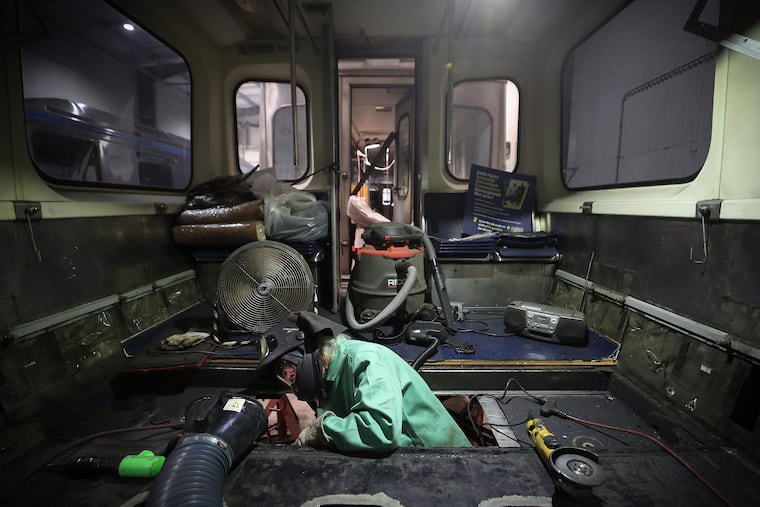SEPTA’s welding instructor trained its welders for years without a license, possibly risking safety
SEPTA says it has found no problems with welds. Transport Workers Local 234 says managers should be fired for neglecting the issue.

The former chief instructor in SEPTA’s welding school practiced for nearly two decades without the professional credentials required to qualify for his role, an investigation by the transit agency’s Office of Inspector General found.
As a result of having no license to teach, Thurman “Ed” Hogan fraudulently certified welders as meeting the safety and professional standards of the American Welding Society, a regulating body, IG Denise S. Wolf said in a report dated Sept. 6.
SEPTA welders work on railings and bridges and also fabricate and repair track and switches, jobs critical to safety.
“If this welding is not done according to AWS standards, a catastrophic failure could result,” Transport Union Local 234 wrote in a recent member newsletter, calling the report a “devastating” exposé of managerial incompetence.
Hogan was fired within the last several weeks, SEPTA said. He had been relieved of his duties May 29 and placed on paid leave until the investigation concluded. The inspector general also recommended the 34-year employee lose his pension and health-and-welfare benefits.
Hogan did not return messages seeking comment.
“We can certainly understand why people would have concerns, but we want to stress to riders that our welds are safe,” SEPTA spokesperson Andrew Busch said. Tracks and switches are inspected daily and other critical welds are scrutinized at regular intervals, he said.
The IG’s report did not identify any safety or quality problems with work performed by welders trained or certified by Hogan.
SEPTA has been retraining and testing 43 welders who had been certified by Hogan, Busch said, adding 14 remain to be recertified. There are about 95 welders working among the Regional Rail department, on transit rail in the city and suburbs and in the bridges and buildings department.
Welders ordinarily must re-qualify every two to three years, depending on where they work, Busch said. Those who are track fabricators retrain for five to six days and must pass three tests, he said. Rail maintenance welders study for two weeks in a course that includes four certification tests, and a refresher on maintaining switches.
The investigation found Hogan failed to maintain his credentials from about 2005, when he was due for a nine-year recertification as a welding instructor, to 2021.
Hogan took a test from the welding society in attempt to regain his credentials in 2007 but failed it, the IG report said. He misrepresented himself as licensed in internal SEPTA communications and in records filed with state and federal regulators, the investigation found.
The Office of Inspector General launched the investigation Oct. 6, 2023, after receiving an anonymous formal complaint, the report said. Allegations about Hogan’s status began surfacing in September when employees expressed concerns to safety officials, the report said.
Meanwhile, Hogan had been promoted from chief welding instructor to manager of technical training on Oct. 1, 2023. He was paid $99,320 annually before that final promotion, according to SEPTA payroll records.
Before becoming the chief instructor for SEPTA’s welding school in 2021, Hogan was an instructor in the program.
In its recent newsletter, TWU Local 234 called for Hogan’s direct supervisor and the head of human resources to be fired for, in its words, “reckless disregard of the safety hazards created by a structural welder certification program tainted by fraud.”
Busch said SEPTA could not comment on personnel matters.